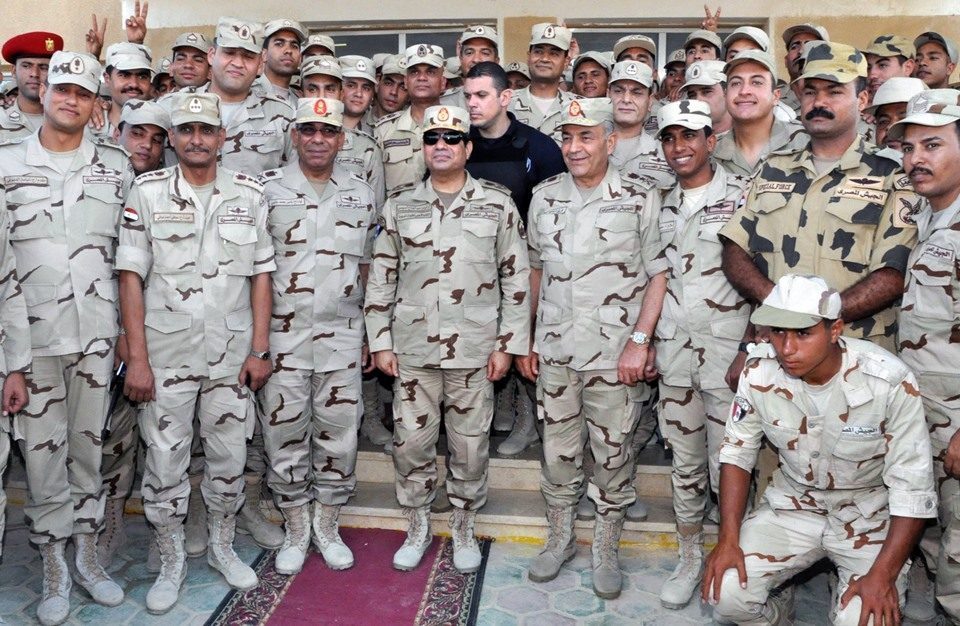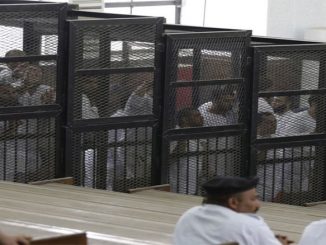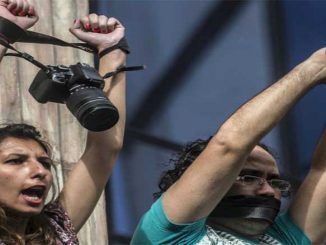
The salaries of the Egyptian Armed Forces officers have been an issue of a great concern especially that it have increased more than once during the past five years, according to Arabi 21. On the contrary, the salaries of the public and private sectors civilian employees remained as they used to be. In addition, poverty has dramatically spread in an unprecedented way especially in upper Egypt’s governorates.
Recent surveys pointed that the salaries of armed forces officers have increased more than once since the 25 January Revolution in 2011, especially after the military coup in July 2013 led by Abdel Fattah al-Sisi who was Egypt’s defense minister during at the time.
Despite the ambiguity imposed by the military institution regarding the salaries of their officers and high rank leaders, Arabi 21 said – citing Middle East Monitor – that the salaries of the commanders in the armed forces and the members of the Supreme Council of the Armed Forces (SCAF) range between 100,000 and 500,000 monthly.
In the same context, activists on the social networking sites and some news agencies have circulated a table including the salaries of other military ranks in the military that reads the following; “The major general earns monthly LE 10,600, the brigadier LE 9400, the colonel LE 8250, the lieutenant colonel LE 7100, the major LE 6500, the captain LE 5900, the first lieutenant LE 5200, and the sergeant LE 3500.”
The table showed that the total monthly salaries of the armed forces officers amount to about 1 billion and 513 million Egyptian pounds for an average of 200 thousand officers, while the salaries of sergeants were about 350 million Egyptian pounds monthly for an average of 100 thousand sergeants.
Accordingly, the average total military salaries reach nearly 2 billion Egyptian pounds a month, as shown in the schedule circulated in the social media.
“Above the State”: Armed Forced Data Not Under Oversight
In a study prepared by the researcher at Carnegie Middle East Center -Yezid Sayigh titled:” Above the State”, it noted that “There is a special office at the Ministry of Finance for auditing the accounts of the armed forces and the affiliated bodies, but its data is not under the control or oversight of any authority, not even the Egyptian parliament.”
“How much money the army enterprises generate, or how it is spent, is protected as a military secret. Some of these funds are probably spent on officers’ allowances, housing and other perks. There are 150 state-owned companies that run exclusively by the “State of the Army”, where only the army officers benefit from their revenues. The salaries of the retired officers working in these companies range between 100 thousand to 500 thousand pounds per month as well as a monthly allowance of not less than 10 thousand pounds. In addition, the army receives $1.3 billion in annual military aid from the United States,” according to the study.
However, some military sources previously said in press releases – which were previously reported by Arabi 21 – that “Al-Sisi didn’t shower all the military ranks with money, increase in salaries, bonuses and pensions but in fact all these privileges that have been the main focus of the media and the public opinion focused mainly on the high ranks and leaders.”
Egypt’s military expanded its economic activities
The Egyptian military, whose budget is not under any supervision, has expanded its economic activities in the country over the last year.
The military has widened its economic activity, including producing cement, supplying medical items to hospitals, running the government’s smart-card system for the distribution of subsidized goods, establishing fish farms and manufacturing water meters. Moreover, last year al-Sisi issued a law that allows the army to set up companies with the participation of domestic or foreign capital.
” Armed forces vans roam the country selling cheap groceries and military retail outlets have popped up, while military agencies have attempted to procure basic commodities from international traders amid shortages,” said Reuters.
In this context, Al-Sisi tend to defend the military in every occasion, saying at a national youth conference held in Sharm el-Sheikh recently that, “In case you’re wondering how large the economy of the armed forces is in terms of GDP, I’m going tell you so it’s clear: 1 to 1.5 %.”
Reuters also said,” the size of the military, which produces everything from bottled water to macaroni, has long been a topic of speculation in Egypt but official comment on the scope of its economic activities is rare.”
Al-Sisi also claimed that the armed forces are not entering the economy to profit or compete with the private sector, and that their projects are subject to taxes and regulatory oversight.
He also added that the military would deliver 1,350 projects by 2018 but did not specify their exact nature.



